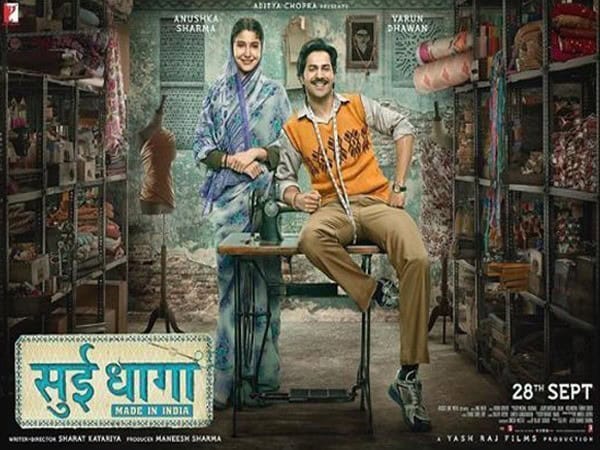Mamta (Anushka Sharma) and Mauji (Varun Dhawan) have been married for quite some time, but there is hardly any chemistry between them, leave aside biology. Most of the time, Mamta is either fetching water from outside the house or is making tea for her father-in-law, played by Raghuvir Yadav. On the other hand, Mauji is busy playing the lapdog to his employers, the Bansals, who own a shop in the heart of a big city.
Though the director, Sharat Katariya, hasn’t named the places, it’s evident he is talking about Delhi and Ghaziabad. This could be any city’s story though.
Mamta and Mauji show basic respect for each other, a must deliverable for married couples in traditional social set-up in India. Even then they have a lot to explore together; incidentally, they haven’t yet touched each other, informs the opening voice-over in the film.
So, when Mamta sees Mauji happily playing a dog during a party at the Bansals, she gets heartbroken. Despite being on the wrong side of the line of poverty, she never expected this. She can still put up with this, but Mauji’s inability to see anything problematic in his actions devastates her from inside.
In fact, if you take a look at Karatiya’s last directorial, Dum Laga Ke Haisha, you’ll find the female lead’s desire to live a dignified life playing a significant role in the development of the characters around her. Like Sandhya, Mamta is not ready to strip herself of the basic respect one deserves. She isn’t as skillful as Mauji, but she is ready to lend him the support he requires.
Her pain is channelised in her dialogue when she meekly retorts, “Yahi sab aata hai kya aapko (Do you know only this?),” in response to Mauji’s emotionally charged question, “Toh kya circus me bharti ho jaun (Should I join the circus?).
The set-up couldn’t be simpler. There’s a retired father, who has never been anything more than a wallflower, and a mother whose only wish is to get two buckets of water before the municipality stops the supply for the day. They keep mumbling to themselves and don’t know from where there next meal will come from in the hours of crisis. They have never known the value of hope and dreams.
This is where Katariya’s film starts to take concrete shape. Here’s a woman who is ready to give it all up for her husband, whom she thinks is skillful enough to run his own show. She is quite aware of her own self as well. In a scene when Mauji gets agitated and talks about his hard work, she humbly reminds him that they are together in this.
It’s that part of the society which isn’t as aspirational as the educated middle class living and thriving in mega cities. Katariya’s people are struggling to make the ends meet but they can sense opportunities.
Unfortunately, these opportunities come too fast and too abruptly in Sui Dhaaga. At times, you’ll feel that they are having it too easy and in real life, things might not be as dramatic as they are in the film.
Not to spill the beans, but important aspects like the generation of fund to start a company haven’t been kept out of the screenplay. The lead actors seem facing difficulty to adjust to their surroundings. The casting of support cast, especially their clothing and make-up, is spot on. Raghuvir Yadav, in one of the final scenes, will charm you the way only he can.
Actually, Sui Dhaaga has been conceived well. It tries to include what’s been left by the mainstream filmmaking for years. In my opinion, its biggest success is the simplicity of idea. It’s not exactly a success if it doesn’t reach to the bottom.
Varun Dhawan surprises with his willingness to take risks. Who would have thought he could play a docile character with such ease? He weaves his suits and charm with equal finesse. Anushka Sharma holds her own and never lets anyone snatch her spotlight.
At 122 minutes, Sui Dhaaga is endearing for sure.

